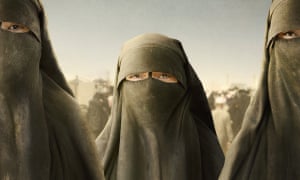The White Lotus is the best satire of wealth privilege on TV right now
The spiky six-part HBO mini-series by Mike White captures the self-delusion and defensiveness of the wealthy white one-percenters in the US

There’s a moment in the fourth episode of The White Lotus, the spiky six-part HBO limited series about a sour week between staff and guests at a Hawaiian resort, that epitomizes the show’s deft grip on the language of privileged self-delusion. Nicole Mossbacher (an unparalleled Connie Britton), the chief financial officer of a Facebook-esque tech company, asks her daughter Olivia (Euphoria’s Sydney Sweeney) and friend Paula (Little Voice’s Brittany O’Grady), both bratty college sophomores, for a favor – could they include Olivia’s brother, Quinn (Fred Hechinger) more?
“I don’t think you appreciate how tough things are for kids like Quinn right now,” she explains, rubbing sunscreen on her tanned arms. “He is a straight, white, young man, and nobody has any sympathy for them right now.”
Olivia, fluent in both cruelty toward her family and online appearances, rolls her eyes. Paula, a guest on the Mossbachers’ vacation and, like most of the staff at the White Lotus, a person of color, adds that maybe it’s “impossible” to hire straight white male candidates, as Nicole argues, because “up until now, they’re the only people that you’ve ever hired.” She gets it, Nicole assures – “I’m just saying I understand how guys like Quinn can feel a little alienated from the culture right now.”
Nicole’s reasoning is a near-transcription of language I’ve heard among white, moneyed families concerned about the prospects for their children, and a testament to creator/writer Mike White’s understanding of the gulf between emotional truth and material power, cultural shifts and actual change. Nicole’s not wrong, on an emotional level; Quinn is alienated – from his family, who treat him as an afterthought or a nuisance, from genuine connection outside his phone. But he is not, from a bird’s eye view, actually at a disadvantage.
The scene illustrates The White Lotus’s key insight on wealth privilege in the US, above and beyond a slate of HBO shows about rich white people being miserable and/or terrible, from Big Little Lies to The Undoing to Succession. It’s not just, as Sophie Gilbert put it in the Atlantic, that the privileged “would rather be miserable than lose even a tiny fraction of the things they’ve been given”. It’s the mental gymnastics Nicole does to justify her sense of aggrievement, the delusions constructed to believe you think the right things, or are being a good person, while still protecting one’s wealth.
This thorniness is somewhat of a White speciality; his work has consistently plumbed, without mocking, the chasm between good intentions and spoiled actions. White’s writing often captures, with stomach-churning accuracy, the way a certain class of wealthy white people can react with both extreme sincerity and self-centeredness at once. His HBO show Enlightened, co-created with Laura Dern, was a critically beloved but prematurely canceled dark comedy about one woman’s corporate-laced journey to self-fulfillment after an emotional breakdown. The White-penned indie film Beatriz at Dinner, directed by Miguel Arteta, follows the the unwitting guest of a dinner party at an Orange county mansion, a holistic healer played by Salma Hayek, as her hosts’ politeness evaporates when she grates at their excess. The similarly bleak comedy Brad’s Status, written and directed by White, focuses on a man consumed with envy for his friends in the 1%.
Miserable rich white people can become an absorbing, moody aesthetic (Big Little Lies, The Undoing), but The White Lotus is meticulous in unspooling its characters’ emotional vulnerabilities while still skewering the pretensions of class. It perhaps invites the biggest comparison to Succession, another razor-sharp HBO dramedy about a media conglomerate family and their orbit. Both depict the territoriality of the rich, but whereas Succession offers thrilling voyeurism into the 0.0001%’s boardrooms, The White Lotus steers closer to a more pervasive, insidious 1% status anxiety.
Succession is “a great show, but it’s very king’s court,” White told the New Yorker. “You can kind of otherize them. They’re billionaires. With White Lotus, I wanted it to be more, like, this is your nextdoor-neighbor rich person who is part of the system.” The guests in The White Lotus, including the Mossbachers, are rich, but they’re the kind of rich you find in any US city, at any luxury resort at any warm-weather destination.
For all the generosity afforded to its characters – most guests merit a couple of ounces of sympathy – The White Lotus presents, by mid-season, a caustically bleak comment on the rot at the heart of the entire enterprise. There’s the unnamed body, in a plane-bound “human remains” container, at the start of the first episode (the rest of the series covers the week prior), and a sense of ominousness hangs over the whole season. Sun-dappled pool scenes are bookended by wordless shots of the churning ocean; large, leafy greens crawl over the bedspreads. Fruit withers on the wallpaper in the title sequence. Interpersonal dinner drama unfurls to a creeping score by horror master Cristobal Tapia de Veer (Black Mirror), the pulsing bass flute like a ghost panting over your shoulder.
Bleaker still is the show’s merry-go-round of use and get used, which doesn’t spare the staff. High-strung hotel manager Armond (Murray Bartlett) uses Kitty (Molly Shannon) to disrupt her obnoxious son Shane’s (Jake Lacy) honeymoon with Rachel (Alexandra Daddario); Kitty uses her trip to assert her dominance over Rachel in trust fund baby Shane’s life. Jennifer Coolidge delivers a masterly performance as Tanya McQuoid, a rich alcoholic whose bottomless vortex of need is both genuinely sympathetic and vampiric to everyone around her, especially her favored masseuse, Belinda (Natasha Rothwell). Belinda and Rachel are more sympathetic characters, but even they have their reasons for staying in the lopsided partnerships they’re in. Quinn is almost too sheltered and powerless within his family to dislike, but his fascination with native Hawaiian canoers – the one thing that draws him away from a screen – is laced with exoticism.
No one is spared the corrosive effects of moneyed exploitation, even as it masquerades as paradise. “Nobody cedes their privilege,” Nicole’s husband, Mark (Steve Zahn), says at a late episode dinner. “That’s absurd. It goes against human nature. We’re all just trying to win the game of life.” The White Lotus burrows into the violence of this logic; it’s not just faith in the virtue of the game that’s toxic, but the sugar – justifications, defenses, delusions, unashamed ignorance – that helps it go down.



